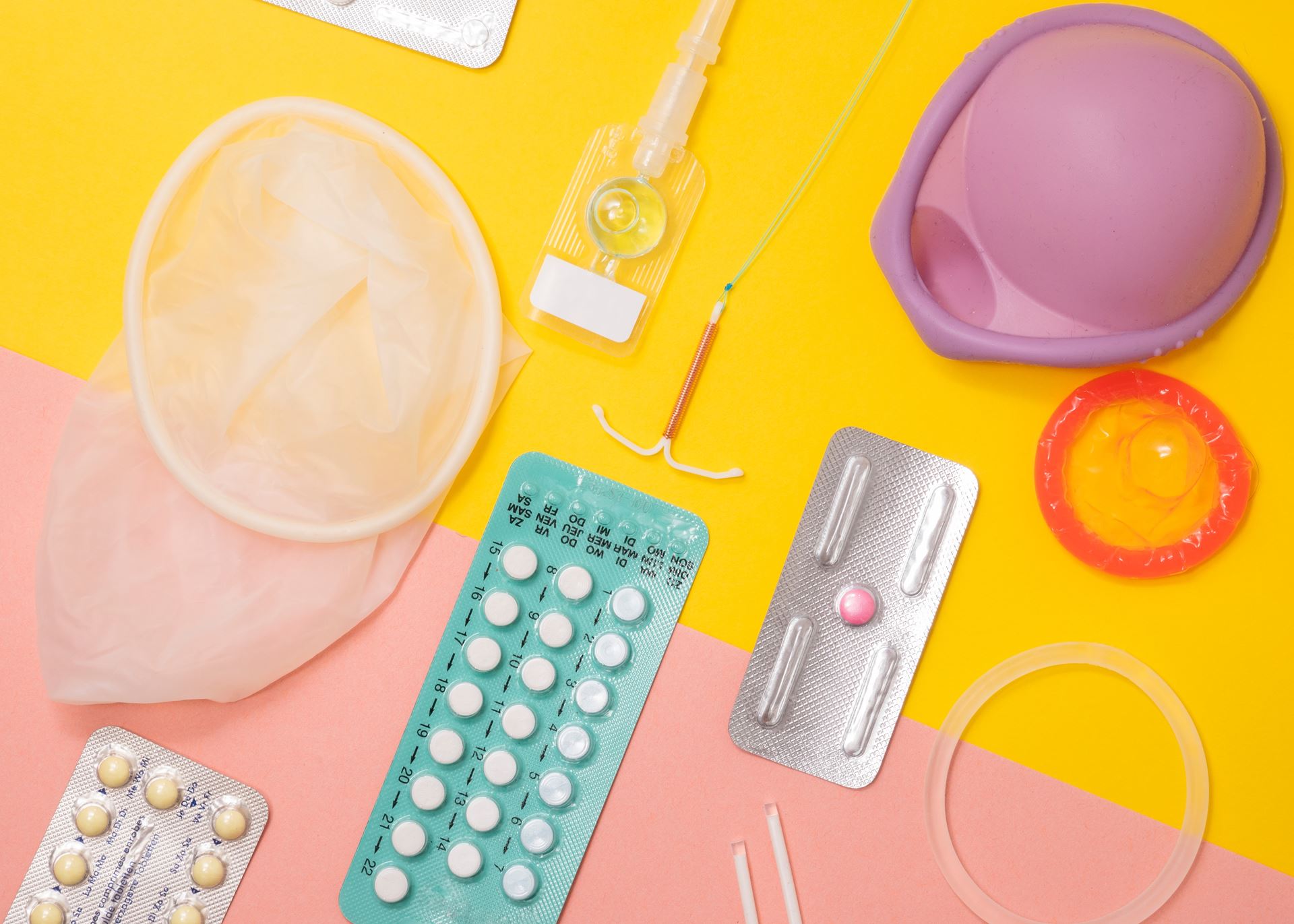Sexual Health
Sexual Health, Contraception and Cervical Cancer Vaccine
The surgery offers advice and treatment for:
- sexual health
- sexually transmitted diseases
- contraception
- termination of pregnancy.
Everything we do is CONFIDENTIAL - teenagers are entitled to confidential consultations even if they are under 16.
- If you need contraception - come and talk to us
- If you're worried you may have caught something - come and talk to us
If you're worried you may be pregnant - come and see us, we can help.

Contraception

The surgery offers almost all forms of contraception including:
- morning after pill
- advice on condoms and where to get them
- the contraceptive pill
- the mini pill
- the depot injection
- Advice on diaphragms and the rhythm method
- advice on sterilisation
The run down on contraception
but first......Chlamydia
- before we start, if you're having sex you need to think about Chlamydia
- be smart, get a test from the surgery and do it
- results are texted to your mobile or emailed to your personal account
- treatment is quick and easy
Condoms
There's only one sort of contraception that protects you against sexually transmitted disease and that's CONDOMS.
Condoms are not great protection against pregnancy, but they stop you catching and passing on chlamydia, syphilis, gonorrhea, herpes, genital warts, HIV and other sexually transmitted diseases.
Sound horrible? they can be horrible. You can't be cured of genital herpes - it keeps coming back. And we all understand how hard it must be to live your life with HIV.
BE WISE - USE A CONDOM AS WELL
'The morning after' pill
If you've had unprotected sex don't wait till your pregnancy test is positive:
- Consider taking the 'morning after pill'
- You have up to five days to take it
- It is highly effective - although not perfect
- The earlier you take it the better it works
- You can get it free from us, the family planning clinic, the walk in clinic or the out of hours service
- You can buy it from any pharmacy
- Remember - this is NOT AS GOOD as proper contraception
- If you need the morning after pill talk to us about improving your contraceptive cover so there isn't a next time
The contraceptive pill
There are basically two sorts: the combined pill and the progesterone only pill (or mini pill).
The combined oral contraceptive pill
- is taken for 21 days out of 28
- is very good protection against pregnancy - more than 99% effective
- makes your periods lighter and keeps them regular
- can help problem skin
- doesn't usually make you put on weight
- isn't suitable for those who have visual migraines or a family history of clotting problems
- can't be used in the over 30s that smoke
- should be avoided in the over 30s who are very overweight
- carries a slightly increased risk of thrombosis
- may be interfered with by antibiotics, vomiting, diarrhoea or forgetting to take it
- does not protect against sexually transmitted infection
The mini pill
- isn't quite as effective as the combined pill but still over 99%
- is taken for 28 days out of 28
- does not always regulate periods but can make them light, irregular or absent
- is suitable for those who have visual migraines or family history of clotting problems
- can be used in the over 30s that smoke
- the thombosis risk is much less
- may be interfered with by antibiotics, vomiting, diarrhoea or forgetting to take it
- does not protect against sexually transmitted infection
- further information
The Depo injection
- is given by the nurse
- lasts 12-13 weeks
- tends to make your periods disappear
- highly effective at preventing pregnancy - >99%
- cannot be 'lost' due to upset stomach or antibiotics
- makes about 10% of users hungrier - so they gain weight
- does not protect against sexually transmitted infection
The Implant
- is a little rod placed under the skin of your upper arm
- cannot be seen
- lasts 3 years
- put in like an injection
- removed with a tiny bit of local anaesthetic
- releases hormone a bit like the mini pill
- tends to make periods light, irregular or absent
- cannot be lost due to upset stomach or antibiotics
- does not protect against sexually transmitted infection
- further information
The Mirena 'coil'
- is put into the womb by a specially trained doctor
- extremely effective - nearly 100%
- makes periods lighter or non existent
- lasts 5 years or until you take it out
- fitting is uncomfortable, especially if you haven't had children
- side effects are minimal
- a safe option in those at risk of thrombosis
- does not protect against sexually transmitted infection
The copper coil
- is put into the womb by a specially qualified doctor
- very effective but less so than the Mirena
- various types which last from 3 to 10 years
- does not completely prevent ectopic pregnancies (in the tube)
- can't be lost if you're unwell nor interrupted by antibiotics
- makes your periods heavier and more painful
- does not involve hormones
- does not protect against sexually transmitted infection
- further information
Vaginal ring
- small, soft plastic ring
- left inside the vagina for 21 days out of 28
- about 4mm thick, and 5.5cm indiameter
- continually releases oestrogen and progestogen
- more than 99%effective
- one ring will provide contraception for a month, so you don’t have to think about it every day.
- still effective after vomiting or diarrhoea.
- periods are usually lighter and less painful.
- carries slightly increased risk of thrombosis
- does not protect against sexuallytransmitted infections
- further information
Caps and diaphragms
- Barrier methods inserted into the vagina before sex
- Used with spermicide gels and pessaries
- 92-96% effective
- Using them well takes practice
- Weight gain may make them stop fitting
- does not protect against sexually transmitted infections
- further information
Natural Family Planning
- works by plotting the time of the month when you're fertile and when you're not
- several signs are monitored
- learned from a family planning teacher
- learn to record your body's fertility signals
- needs commitment and practice
- involves condoms or refraining from sex during fertile time
- does not protect against sexually transmitted infections
- further information
HPV, or Cervical Cancer Vaccination
Cervical cancer is one of the most common cancers in women, and mainly affects women in their thirties and forties. It is believed that vaccination against HPV will greatly reduce the incidence of cervical cancer in this country.
As you may know the government have recently introduced a new vaccine, cervarix, which protects girls against HPV, the virus that causes most cervical cancers.
The vaccine is licensed in young women up to the age of 26. However it is most effective if given before first sexual activity, and for this reason the government vaccination campaign focusses on girls under 21.
The vaccine is being given to some girls in school, and girls currently aged 12-13 will have begun the course of three vaccines in school already. Older girls can attend their GP surgery for vaccination if they wish.
This vaccine is very safe. The earlier it is given, the better as it takes six months to complete the course of three injections.
If you or your daughter have any questions about the cervical cancer vaccine please come in to talk to the doctor or nurse. Alternatively if you would like to have a course of vaccination (this is free on the NHS) then please book an appointment for vaccination.
For lots more information on the HPV vaccine and cervical cancer go to:
Page created: 21 December 2023